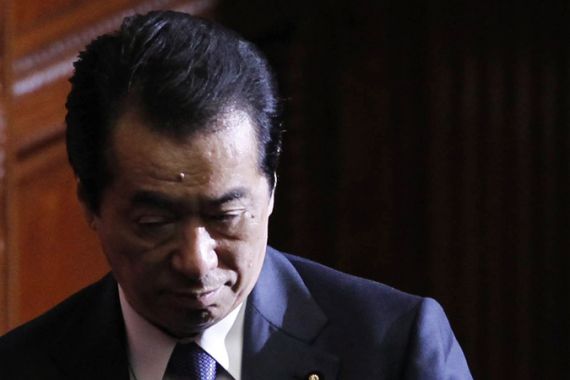Japan’s prime minister announces resignation
Naoto Kan confirms he is stepping down, paving the way for a race to elect Japan’s sixth leader in five years.

| Kan’s resignation was expected after having been criticised for his mishandling of the March 11 nuclear disaster |
Naoto Kan, the embattled Japanese prime minister, has announced his resignation, paving the way for the nation’s sixth prime minister in five years to steer a recovery from the March disasters.
Kan informed senior party officials of his decision to step down as ruling party leader on Friday, Japanese media reported, before addressing the media in a live televised news conference.
“I resign as the (party) president effective today,” Kan told party officials. “I will leave the post of prime minister once the new leader is decided.”
Al Jazeera’s Steve Chao, reporting from Tokyo, said: “The sad part in all of this is that Naoto Kan only lasted 14 months at the top, and at the time when he was inaugurated as prime minister there were hopes that he could be the one who could overcome this revolving door at the top.”
But Kan’s resignation was expected almost six months since the devastating March 11 quake, tsunami and ensuing nuclear disaster sorely tested his leadership, and prompted accusations he mishandled the crisis.
After surviving a no-confidence vote in June, Kan said he would quit on the condition that three key bills were passed – a second budget, a budget financing bill, and legislation promoting the use of renewable energy.
The final two bills were passed on Friday.
Kan is expected to officially step down from his party and government posts when the ruling Democratic Party of Japan (DPJ) elects a new party president, which Yukio Edano, chief cabinet secretary, said would take place on Monday.
Parliament would then vote the leader in as prime minister on Tuesday next week.
‘Leadership is fickle’
Up to nine candidates could end up jockeying to succeed Kan, including the favourite, Seiji Maehara, the former foreign minister.
Yoshihiko Noda, the finance minister, may also file for candidacy when campaigning begins on Saturday.
Whoever wins faces the unenviable tasks of overseeing Japan’s biggest post-war reconstruction, the resolution of the world’s worst nuclear crisis since Chernobyl 25 years ago and shielding the economy from a soaring yen.
They must also unite a divided parliament and win market confidence that Japan can overcome a legislative quagmire to address the world’s biggest debt.
“The latest power change will yet again give the world the impression that Japan’s leadership is fickle,” said Shinichi Nishikawa, professor of politics at Meiji University in Tokyo.